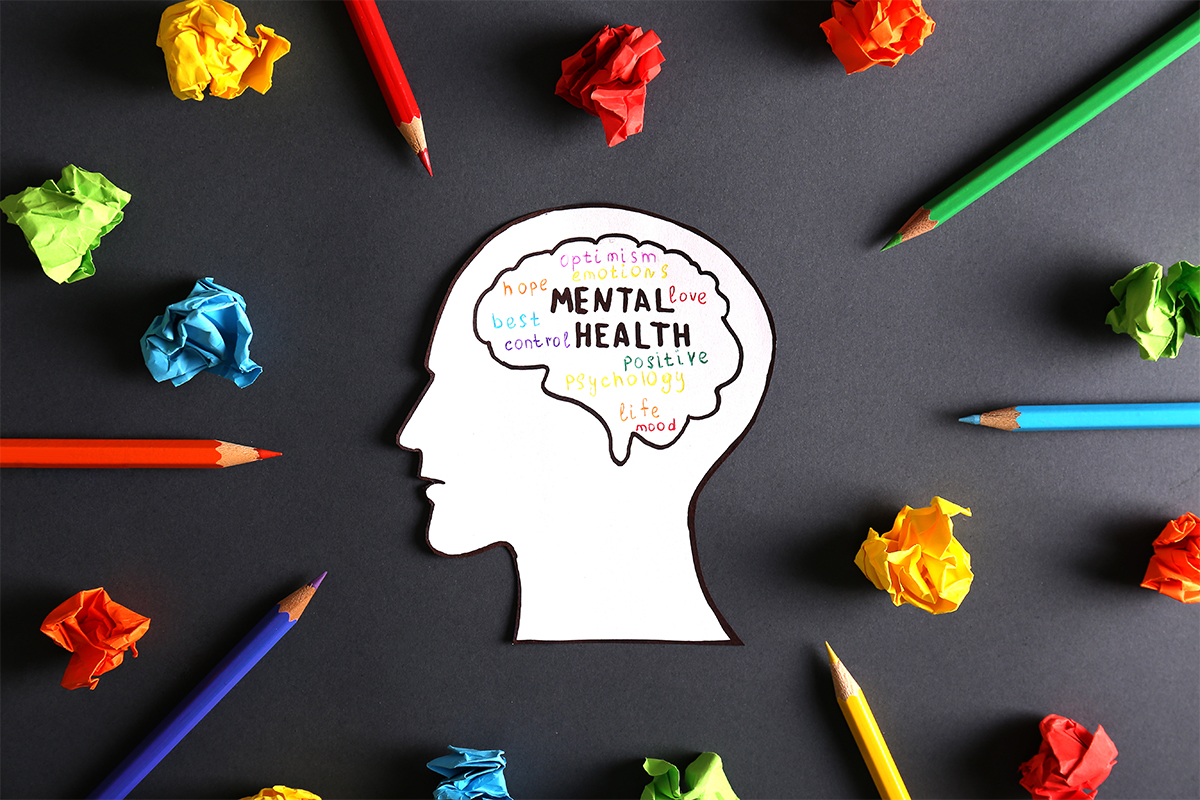You may have suffered with your mental health in the previous few years, whether it was due to a slight setback or a full-fledged crisis. When faced with a seemingly never-ending stream of negative news on top of life's typical problems, it may be tough to prioritize oneself while pursuing educational and professional objectives. Focusing on your mental health is one of the most effective ways to enhance your entire quality of life.
The National Institute of Mental Health (NIMH) reports that one in every five persons now experience moderate to severe mental health conditions. According to the Centers for Disease Control and Prevention (CDC), more than half of Americans will experience mental illness at some point in their lives. But what precisely is mental health, and why does it matter?
What is Mental Health
The US Department of Health and Human Services defines mental health as a person's "emotional, psychological, and social well-being."
Dr. Darleen Dempster, a clinical faculty member at Southern New Hampshire University (SNHU), explains that good mental health leads to a positive outlook, ability to complete daily tasks, maintain relationships, and engage in meaningful recreation. "This includes a sense of balance and empowerment to set boundaries and address life and work goals, step by step."
Aside from the effects on your daily life, major mental health difficulties may have an influence on your relationships, employment, education, and long-term objectives. As the prevalence of mental illness rises globally, treating mental health issues as they occur may improve — or even save — your life.
Read also:
- WHAT IS EMOTIONAL WELL-BEING? WAYS TO IMPROVE YOUR MENTAL
- WHAT IS THE DIFFERENCE BETWEEN MENTAL HEALTH AND MENTAL
- WHAT IS POSITIVE PSYCHOLOGY, AND WHY IS IT IMPORTANT
Why is Mental Health Important for Students

The World Health Organization (WHO) reports a significant increase in mental illness in recent years, with the COVID-19 pandemic worsening the situation globally. Addressing mental health concerns is more crucial than ever for students who want to be psychologically healthy and achieve their scholastic and personal objectives.
Even before the epidemic, mental health was a major issue among students. In 2019, the National College Health Assessment (NCHA) found that many students expressed exhaustion, loneliness, and overwhelm, among other symptoms and issues. Of the polled students, 20.2% reported sadness and 27.8% expressed anxiety that had an impact on their schoolwork in the previous year.
"College can be a stressful time as you manage academic demands on top of other life demands," Dempster went on to say. "However, just as many students can learn to be successful academically, you can also learn to manage and improve mental health outcomes, including managing stress."
Ways to Cope with Stress
Stress management can be a vital aspect of student success, especially for busy students who may also be working or caring for others. Dempster and the CDC recommend several methods to help manage stress:
- Adequate sleep
- Avoidance of alcohol and substance abuse
- Breaking down large tasks into smaller, more manageable tasks
- Cultivating healthy relationships
- Eating well
- Exercising
- Meditation, breathing exercises and other self-care activities
"At times, it is necessary also to set boundaries, to communicate needs, to be flexible to changing circumstances and to let go of perfectionistic standards," Dempster said in a statement. "There should be no shame in seeking out mental health care as needed, just as one would not feel shame in seeking medical care for a persistent medical issue."
Some universities provide free, real-time mental health assistance to students; for example, students at SNHU may use the school's HelpU program. If you are a student dealing with mental health, find out what options are available at your school.
How is Mental Health Connected to Physical Health
According to the National Institute of Mental Health, many mental diseases, such as sadness and anxiety, may result in inexplicable physical symptoms. The CDC warns that mental illness may raise the risk of diabetes, stroke, and heart disease. Additionally, severe mental disorder can lead to significant illness after getting COVID-19. Simultaneously, persistent physical health concerns might exacerbate mental health problems.
"A healthy diet, adequate sleep, and regular exercise can all have a positive impact on our mental health." Conversely, a lack of sleep, a bad diet, and a lack of exercise might impair our capacity to cope with stress and life's responsibilities," Dempster said. "Tension, worrying thoughts, or other emotions might cause mental health problems to become physical symptoms. As a result, mental and physical symptoms are inextricably linked.
What Are Examples of Mental Health Problems
Mental health problems can affect your life in various ways, depending upon the issue or disorder. The following are examples of different mental health problems and their corresponding challenges and symptoms.
Anxiety and Depression
According to the National Institute of Mental Health (NIMH), about one-third of persons will suffer an anxiety disorder in their lifetime. Anxiety symptoms might include tension or anxiousness, as well as panic attacks and physical disease. Anxiety may include generalized anxiety disorder, social anxiety, separation anxiety, particular phobias, and other anxiety-related illnesses.
According to the National Institute of Mental Health, depression is another prevalent condition that may have a significant influence on a person's life. Symptoms may include chronic sorrow, emptiness, irritation, decreased motivation, guilt, or feelings of poor self-worth. People suffering from depression may also have difficulty concentrating, aches and pains, digestive troubles, or changes in their sleeping and eating patterns.
Suicidal ideation and behavior are among the most dangerous signs of depression.Suicide is the 12th largest cause of death in the US, but it is the 2nd top cause of death among those aged 10-14 and 24-34, and the 3rd leading cause of death among Americans aged 15-24, according to the National Institute of Mental Health. According to the CDC, suicide rates increased by 30% between 2000 and 2020.
Trauma and Addiction
Traumatic events or experiences may trigger post-traumatic stress disorder (PTSD) in individuals. PTSD symptoms include flashbacks, unwelcome memories, nightmares, and panic attacks. Although the disease is often linked with war veterans, PTSD may be caused by a number of traumatic situations, including assault, abuse, major accidents, and loss.
The CDC reports a significant increase in drug overdose mortality during the 1990s, highlighting addiction as a growing mental health risk. The National Institute on Alcohol Abuse and Alcoholism reports that alcohol is the most commonly misused drug, accounting for 5.3% of fatalities globally. Addiction is a difficult condition that often requires professional treatment to conquer.
Other Disorders
According to the National Alliance on Mental Illness (NAMI), psychotic illnesses are among the most stigmatized in society, further alienating those living with them and seeking treatment. Psychosis is described as a disconnection from reality shown by auditory/visual hallucinations, disordered thinking, or delusions. Psychotic disorders include schizophrenia and schizoaffective disorder. According to the World Psychiatry Journal, individuals with psychosis are more likely to be victims than perpetrators of violence, contrary to popular belief.
Common mental illnesses include obsessive-compulsive disorder (OCD), eating disorders such as anorexia and bulimia, personality disorders including borderline personality disorder, and mood disorders such as bipolar disorder. Each mental health problem presents unique obstacles, as well as treatment options.
Read also:
- HEALTHY COPING STRATEGIES FOR UNCOMFORTABLE EMOTIONS
- HOW COLOUR IMPACTS MOOD AND MENTAL HEALTH
- MENTAL HEALTH AWARENESS: THE VALUE OF TALKING
What Are Warning Signs and Risk Factors of Mental Illness
Some mental diseases may be inherited, whilst others are acquired. Dempster identifies many warning signals of mental health concerns, as well as other risk factors that may contribute to mental health problems.
Here are some warning indicators of mental illness:
- Appetite changes
- Disruption of sleep
- Engaging in risky behaviors (self-harm, sexual acting out, disordered eating or other compulsive behaviors)
- Mental distress (worrisome thoughts, tension, insecurity)
- Negative impacts on relationships (isolating, arguing, etc.)
- Substance abuse
- Suicidal thoughts
Other risk factors of mental illness include:
- Adverse childhood experiences
- Past or present trauma
- Present or past experiences of being abused or assaulted
- Sudden loss
If you are experiencing warning symptoms of mental illness, consider seeking treatment from a professional. If you or someone you know is experiencing any of these symptoms, Dempster suggests using the "QPR" method.
"A great way to help a loved one into care is to remember the acronym QPR, which stands for Question, Persuade, Refer," Dempster went on to say. "Question: Directly inquire about the individual's well-being, conveying your concern and caring.Persuade the individual to seek help from a mental health professional, who may provide assistance and tools to manage overwhelming thoughts and emotions.Support individuals in getting therapy by assisting with finding available options, scheduling appointments, and transportation. Evidence-based techniques may help address mental health issues quickly.
Many patients see numerous mental health specialists, such as a psychiatrist for medication management and a therapist for more regular therapy sessions. To locate a mental health professional near you, use the Mayo Clinic's recommendations or contact your insurance provider. To find a provider in your region, utilize Psychology Today's directory or Findtreatment.gov's drug addiction treatment finder. The National Substance Abuse and Mental Health Services Administration (SAMHSA) offers an early serious mental health treatment finder tool to help individuals identify treatment clinics in the US.
"Historically, there has been a stigma with seeking mental health care that is not evident in seeking care for physical problems, and this stigma prolonged the suffering of many needlessly and has even cost lives," Dempster said in a statement. "Seeking out care for mental health concerns is a sign of strength and there is robust evidence that demonstrates that mental health care is effective."

